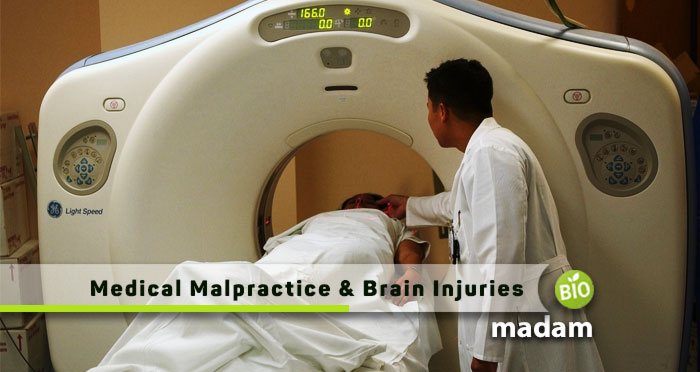Medical malpractice is the failure of medical professionals to meet the standard of care required by their profession, leading to injury or death of the patient. A brain injury resulting from medical malpractice can be devastating for both the patient and their family members. However, patients have legal remedies available when they are victims of medical malpractice that results in brain injuries. According to the CDC, from 2016 – 2018, Colorado witnessed 3776 cases of brain injuries. Such injuries have contributed to a high number of deaths across the nation.
For instance, if you happen to live in Colorado and are suffering from brain injuries due to medical malpractice by a negligent party, you must contact reputable law firms, such as ColoradoInjuryLaw.com. These firms will fight for your rights and get you fair compensation. This post will discuss medical malpractice-related brain injuries, ways to prove medical misconduct, types of compensation available for patients injured due to negligent acts by healthcare providers, and steps to take if you believe you may be a victim.
Understanding Medical Malpractice-Related Brain Injuries
A brain injury occurs when an external force causes damage or trauma to the brain. These injuries usually fall into two categories; Traumatic Brain Injury (TBI) and Acquired Brain Injury (ABI). TBIs result from a blow or jolt to the head or penetrating head injury, while ABIs occur due to internal factors like stroke or lack of oxygen delivery.
A variety of circumstances can lead to TBI/ABI caused by medical errors. Medication overdose can cause anesthesia-related TBIs during surgery. Improper use of obstetrical instruments during birth while using excessive force on an infant’s skull could cause lasting TBI risks such as cerebral palsy or developmental delays.
Proving Medical Misconduct
For any successful lawsuit based on a theory alleging “malpractice,” a plaintiff has a high bar they must clear with courts regarding what constitutes negligence on the part of their defendant caregiver.
To do so, plaintiffs must employ expert testimony from knowledgeable experts within similar fields/specializations as defendants who fulfill an undoubtedly necessary role in every jurisdiction where legal action is taken under this premise.

It’s worth noting that not all treatment cases resulting in unfavorable outcomes constitute grounds for filing such lawsuits against practitioners; natural risks and complications associated with attending any kind-of treatment do exist. Patients must demonstrate the below elements to establish a solid legal argument:
Prove that the defendant had a doctor-patient relationship with you when receiving treatment causing the injury:
The first step in pursuing a medical malpractice case is to prove that you had a “doctor-patient relationship” with your medical professional, essentially proving their duty of care toward patients.
Establish Negligence
The patient must next show that the defendant violated their standard of care by not adhering to commonly accepted practices as may be expected from a qualified practitioner in good standing within their profession under similar circumstances.
Show Causation
Even if the plaintiff establishes negligence, it doesn’t guarantee liability if they cannot display how their health outcome would have turned out differently but for this breach of duty.
Compensation Available to Victims
Patients affected by brain injuries due to medical malpractice are entitled to various types of compensation under the law. The most common forms include economic damages related to financial losses arising from sub-par treatments like medical expenses, loss of present/future earnings, and earning capacity. Another type identified here is non-economic damages focusing on the impact caused due to changes in quality-of-life/personal relationships which could manifest as stress/anxiety disorders or permanent disability, among others.

Punitive damages are another form of compensation that exceeds typical remedies one might expect for malpractice cases. These are designed primarily as a deterrent against healthcare providers committing future immoral actions rather than compensating victims, frequently depending on individual state law interpretation.
Steps to Take if You Believe Your Caregiver Caused Brain Injury Due to Malpractice
Suppose someone suspects that inadequate medical attention has impaired their mental or physical functions on account of neglectful/reckless acts committed during diagnosis, prescription/referral, etc. In that case, immediate legal aid should be sought.
Victims should engage an experienced lawyer specializing in these kinds of lawsuits who can advise concerning appropriate claims procedures, including providing court evidence such as testimonies from other experts and clients who underwent similar experiences, medical records, and carefully documented expenses.
Conclusion
When healthcare providers deviate from the accepted standards of care and cause harm or trauma to their patients’ brains in cases of traumatic brain injury or acquired brain injury, it may be necessary to seek legal counsel. Proving medical malpractice in such cases can be challenging as it requires expert testimonies to establish the liability of the physician or caregiver involved.
However, if successful, patients have the opportunity to receive compensation for various losses. This includes economic damages resulting from reduced earning capacity or medical expenses due to the provider’s negligence. Additionally, patients may also be eligible for non-economic damages to account for the negative impact on their quality of life and emotional well-being caused by avoidable negligence during the diagnosis or treatment processes.

Hi, they call me Jenna, and I am also known for achieving a gold medal during my Ph.D. in science life. I always had a dream to educate people through my utmost writing hobby. So, I chose this blogging path, and Biomadam gave me this opportunity to present for them. I now stand to entertain you. Continue reading my articles & discuss if you’ve any confusion through the comment section below.

